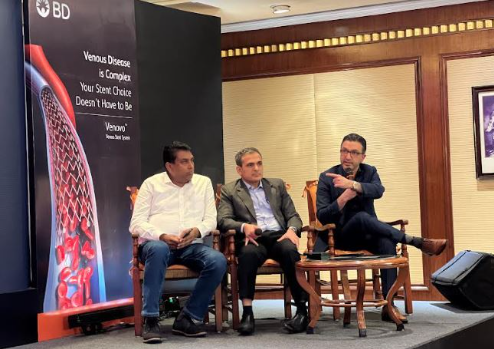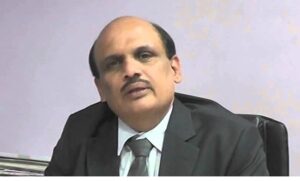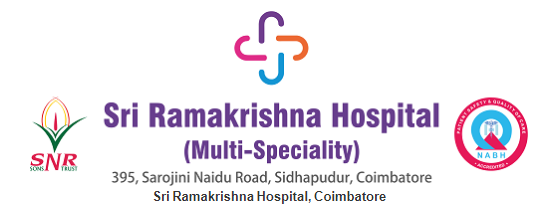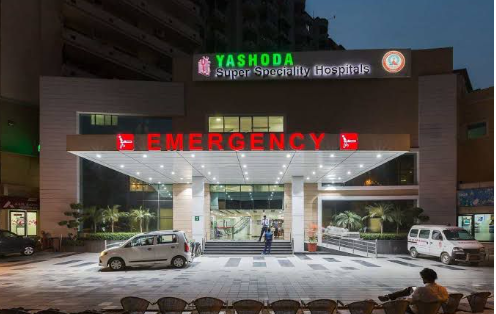Hyderabad, July 26, 2024: The three-day ‘TCT India 2024’ – India’s premier Interventional Cardiology Conference – organized by FACTS Foundation – a non-profit organisation of Cardiologists and Cardiac Surgeons, committed to newer research, innovation, education and training; in association with Apollo Hospitals and Cardiovascular Research Foundation, (CRF) USA; will be held from July 26th to 28th, 2024 at the HICC, Hyderabad. Over 1200 delegates comprising of cardiologists and cardiothoracic surgeons from across India, South Asia and abroad, will be attending the conference. Distinguished faculty including 100 from India and 30 from abroad will showcase and enlighten the delegates with the latest advances in interventional cardiology. Chief Guest Dr Sangita Reddy, Jt. Managing Director, Apollo Hospitals; will inaugurate the TCT India 2024 conference on Friday.
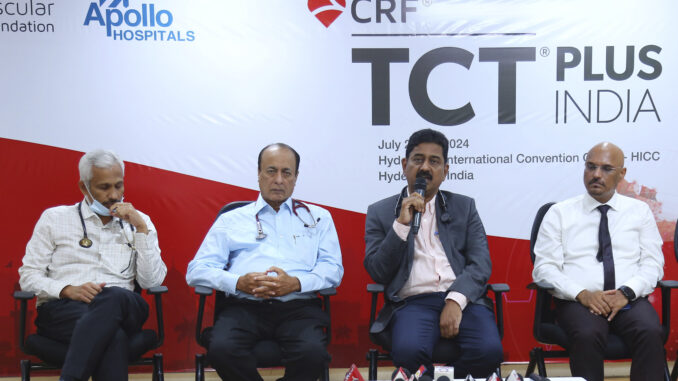
The Conference will have sessions in various Interventional techniques like Hemodynamics, Intracoronary Imaging, Calcium Management, TAVR and other newer Innovations. There will be focused Live case-based learnings with nine live cases from USA, Germany and Australia and 12 live in box cases from various centres spread across India making it a truly Pan India National Event. Live cases will be followed by live case learning points, interactions and related lectures including interesting topics like Future of Structural Heart Interventions; Role of newer devices and interventions in Heart Failure management; Newer Canadian Classification of Acute MI & its relevance in clinical practice; Lifestyle and medical therapies for hypertension; and more.
Dr A. Sreenivas Kumar speaking on the occasion said, this is now the largest Conference of Interventional Cardiologists, with 400 delegates from India and abroad attending it. Several special techniques to deal with cardiac problems which hitherto needed cardiac surgery can be done today by interventional cardiology, through minor aperture, saving the patient from trauma, morbidity, and mortality. In the past when arteries were totally blocked, surgery was mandatory, now there are special techniques to clear the blocked arteries, several such new techniques will be demonstrated and deliberated in this conference. One of the interesting topics for deliberation is, how to survive without getting heart attack for over 100 years, there is a magic drug which if taken as a vaccination every six months, heart attacks can be prevented. Stress, smoking, dietary habits, lifestyle changes are the cause for rise in the incidence of heart attacks. Some have a family history of high cholesterol leading to heart problems, there is relief for such patients with a new injection, which if taken like insulin can significantly reduce cholesterol and prevent heart attacks. It’s difficult to acquire so much knowledge from the most eminent specialists under one roof, this platform brings all of them together and makes the knowledge available in a nutshell to the delegates. The conference overall will address and educate the delegates on the latest techniques beneficial to the patients in terms of speedy recovery and being inexpensive to the possible extent.
Dr M Gokul Reddy, Sr Consultant Cardiologist, Apollo Hospitals, Jubilee Hills; said, the main objective of this Conference is to equip the youngsters in the latest techniques and make them efficient. We are adopting a deep diving training here, wherein each delegate will be trained from basics to the most complex of the aspects.
Dr PC Rath, Sr. Cardiologist, Apollo Hospitals, Hyderabad; said, TCT is the largest interventional council meeting in the world and Hyderabad is privileged to host such internationally acknowledged conference. This Conference attracts the best of the faculty showcasing the most latest techniques and the delegates equally look forward for this Conference every year, to learn the new techniques.
The renowned national and international faculty comprises of Dr Susheel Kumar Kodali M.D., Co-director, NYP/Columbia Valve Center Columbia University Medical Center USA; Dr A. Sreenivas Kumar, Director Cardiology & Clinical Research, Apollo Hospitals, Hyderabad; Dr Ajay J. Kirtane, Director, Columbia University Medical Center / New York-Presbyterian Hospital; Dr Martin B. Leon, Director of Cardiovascular Research and Education, Columbia University Medical Center / New York-Presbyterian Hospital; Dr Juan Granada, President & CEO Cardiovascular Research Foundation NewYork-Presbyterian/Columbia University Medical Center, New York, NY; Dr M Gokul Reddy, Sr Consultant Cardiologist, Apollo Hospitals, Jubilee Hills; Dr Ravinay Bhindi, North Shore Hospital, NSW, Australia; Dr Joanna Wykrzykowska, University Medical Center Groningen, Netherlands; Dr Miroslaw Ferenc, University Heart Center Freiburg, Germany; Dr Guilherme Attizzani, Cleveland University, USA; Dr Pratap Kumar, Meditrina Group of Hospitals, Maldives, Dr Saibal Kar, Los Robles Hospital, USA; Dr Ashish Pershad, Chandler Regional Medical Center, USA; Dr Fazilla Mallik, NHC, Bangladesh; Dr Geza Fontos, Gottsegen National Cardiovascular Center, Hungary; among others.

